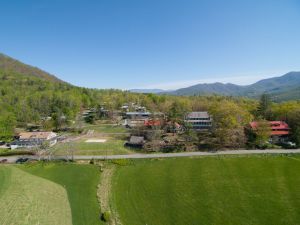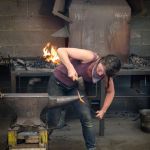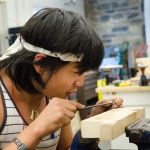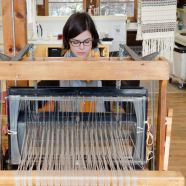
Penland student Liz Koerner using a floor loom in the weaving studio
Share This
Print This
Email This
Penland School of Crafts
Penland School of Crafts is an educational institution dedicated to helping people explore the creative process through working with their hands.
Located in the North Carolina mountains, Penland was founded in 1929 by a remarkable young woman named Lucy Morgan, a school teacher who had a strong interest in handcrafts. The school was an outgrowth of a craft-based economic development program she had started several years earlier, which provided mountain women with looms, materials, and weaving instructions and then marketed their handwoven goods. Although the school began with weaving, it quickly grew to encompass pottery, metalwork, and other traditional crafts. By the time Morgan retired in 1962, the school had acquired an international reputation as a place for experiential, hands-on learning.
Lucy Morgan was succeeded by sculptor, designer, and teacher Bill Brown. Brown established the single-subject, total-immersion workshop as the basis of Penland’s program, and he hired brilliant guest instructors from the ranks of what was being called the studio craft movement. New media—such as blacksmithing, glass, and photography—were added to the program, and the school began offering eight-week sessions in the spring and fall. Brown also started the resident artist program, which provides low-cost housing and studios to artists who work at Penland for several years; a scholarship program to make Penland accessible to a broader range of students; and the core fellowship, which provides nine emerging artists, who do part-time work for the school, with room, board, and access to classes for two years.
Under the leadership of director Jean McLaughlin, Penland’s base of support has been solidified and expanded, and many campus buildings have been renovated or replaced with larger and better facilities. Penland today offers workshops in books and paper, clay, drawing and painting, glass, iron, metals, photography, printmaking, textiles, and wood, with subject matter ranging from traditional techniques to design or narrative content to explorations of the most current ideas in craft. Penland’s instructors are a mix of university faculty and studio artists. Like Penland’s students, instructors come from across the country and overseas. This summer an entire Penland session will be taught by faculty from the art school at Australian National University.
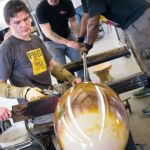
Penland instructor Martin Janecky and his students making a large blown glass piece in the glass studio
Most of Penland’s workshops are open to students of all skill levels, and students from many walks of life, including full-time artists, can be found working together in the same class. From my own experience as a student and an instructor at Penland, I can say that it is a place where people often exceed their own expectations. It’s a place where the process of making and the experience of learning are valued as highly as the beautiful objects that are made.
To learn more, please visit penland.org.







